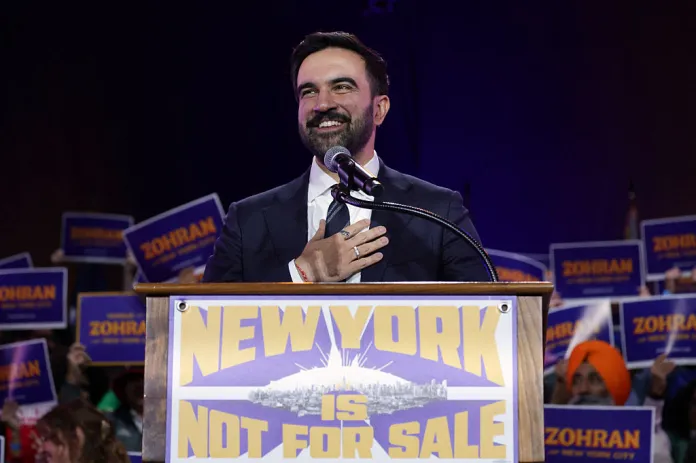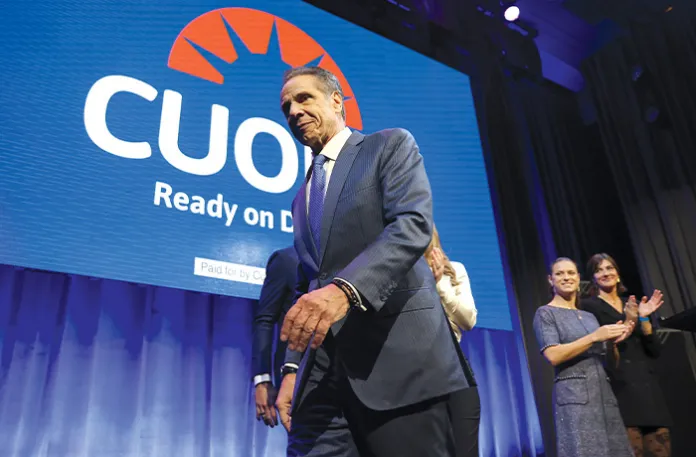At the 1924 Democratic National Convention, Franklin Roosevelt introduced New York Gov. Al Smith as the “happy warrior of the political battlefield.” It’s been a popular pose on the campaign trail for more than 100 years since then, but another New Yorker chose to strike a different pose in his election night victory speech earlier this month.
New York Mayor-elect Zohran Mamdani had a message for his political opponents. One was aimed at a former three-term Democratic governor, the son of an earlier governor who had long been hailed as a liberal hero, who lost to Mamdani first in their party’s primary and then a second time as an independent candidate in the general election. The other was directed at the president of the United States, a longtime New Yorker now serving a second, nonconsecutive term.
The 34-year-old state assemblyman declared that he and his supporters had “toppled a political dynasty,” adding, “I wish Andrew Cuomo only the best in private life, but let tonight be the final time I utter his name.” Next came Mamdani’s middle finger to the president: “So Donald Trump, since I know you’re watching, I have four words for you: Turn the volume up.” He then announced he would be the Democrats’ latest immigration scofflaw in a major elected office. “New York will remain a city of immigrants, a city built by immigrants, powered by immigrants, and, as of tonight, led by an immigrant,” Mamdani said. “So hear me, President Trump, when I say this. To get to any of us, you will have to get through all of us.”
Even some hardened progressive Democrats recognized that this was not the demeanor Mamdani projected on the “political battlefield” as he was seeking to reassure New York City voters that he was no crazed radical. “I think he missed an opportunity,” left-wing commentator Van Jones said on CNN. “I think the Mamdani that we saw in the campaign trail, who was a lot more calm, who was a lot warmer, who was a lot more embracing, was not present in that speech. I felt like it was a little bit of a character switch here.”
Indeed, TikTok videos are not always reflective of reality.

Nov. 4 was a good night for Democrats across the country. The party capitalized on dissatisfaction with Trump, with the Republican majorities in Congress, and with a government shutdown perpetrated by its own members but nevertheless blamed by many on the GOP. Their top candidates presented themselves as centrists, and even if that portrayal wasn’t exactly sincere, the facade held up well enough through Election Day.
Mamdani was different. Yes, he wore a coat and tie. Yes, he downplayed his more inflammatory statements about the police and social issues, even if he did not completely repudiate them. He was laser-focused on “affordability” and cost-of-living issues, just like most other winning Democratic candidates.
New York City has been a notoriously expensive place to live, long before inflation ran at a 41-year high under former President Joe Biden. Far more eccentric third-party candidates have previously made national headlines by repeatedly proclaiming that “the rent is too damn high.” But the last time this country experienced anything like the inflation of the last few years, Mamdani and many of his voters hadn’t been born yet. Even as the rate of inflation falls, and it remains “too damn high” for the Federal Reserve, prices don’t fall to where they were during Trump’s first term. In the NBC exit polls, 55% listed cost of living as one of their top five voting issues. Mamdani won them by 36 points.
But Mamdani was also extremely open about his left-wing sympathies, even if he occasionally soft-pedaled the electorally riskiest parts of his agenda. “I am young, despite my best efforts to grow older,” Mamdani crowed in his victory speech. “I am Muslim. I am a democratic socialist. And most damning of all, I refuse to apologize for any of this.”
In Virginia and New Jersey, the Democratic gubernatorial nominees outperformed their poll numbers. Mamdani, however, did not. He led by 14.3 points in the RealClearPolitics polling average. His final margin of victory was a respectable 8.8 points. Where Rep. Mikie Sherrill (D-NJ) won 56% of the vote in the Garden State gubernatorial race and Democratic former Rep. Abigail Spanberger took 57% in Virginia’s, Mamdani finished with 50.4% — again, a decent showing in a three-way race, but the young socialist was running in the most liberal jurisdiction. GOP nominee Curtis Sliwa stayed in the race but received just 7.1% of the vote, a big drop from his poll numbers that started in the early voting and was perhaps accelerated by Trump’s quasi-endorsement of Cuomo late in the campaign.
It is no accident that Republicans rushed to make Mamdani the new face of the Democratic Party in the aftermath of an otherwise disappointing election. What Mamdani is selling goes far beyond anything former Presidents Bill Clinton and Barack Obama would have proposed, and likely far beyond what much of the country will find plausible or desirable. It split a mostly Democratic electorate in a big, blue city.

To be sure, Mamdani is a Resistance figure, which is what far more mainstream Democrats are currently seeking. “After all, if anyone can show a nation betrayed by Donald Trump how to defeat him, it is the city that gave rise to him,” Mamdani told his jubilant supporters. “And if there is any way to terrify a despot, it is by dismantling the very conditions that allowed him to accumulate power. This is not only how we stop Trump — it’s how we stop the next one.”
That last bit was the only real concession to the likelihood that someone other than Trump himself will be on the ballot in 2028. But this is a results-driven municipal office. Is there an anti-Trump way to fill a pothole or pick up the garbage?
Mamdani’s insurgency aims to take out the Democratic establishment as well. He is in the tradition of Rep. Alexandria Ocasio-Cortez (D-NY) and Sen. Bernie Sanders (I-VT). “We will leave mediocrity in our past,” Mamdani said. “No longer will we have to open a history book for proof that Democrats can dare to be great.”
A few lines before that, Mamdani maintained that his full-throated socialism was the best way to win back working-class voters from Trump and the populist Right. “We have bowed at the altar of caution, and we have paid a mighty price,” he said. “Too many working people cannot recognize themselves in our party.”
Senate Minority Leader Chuck Schumer (D-NY) must be looking over his shoulder. At this rate, he might keep the government shut down through Christmas.
Yet it is not at all clear that the working class delivered Mamdani the mayoralty. People without college degrees gave a plurality of their votes to Cuomo, according to the exit polls. Cuomo and Sliwa combined carried 57% of college dropouts and 59% of those with just a high school diploma. Mamdani won 57% of those with bachelor’s degrees and 57% of voters with advanced degrees.
While Mamdani’s worst, and Cuomo’s best, income group was the 8% of New Yorkers who reported earning at least $300,000 a year, the socialist won 53% of those making $30,000-$49,999, 56% of those earning $50,000-$99,999, and 55% of those with incomes between $100,000 and $199,999. Mamdani even took a 5-point lead among those making $200,000-299,999 while losing voters with annual incomes under $30,000. The core Mamdani voter is a well-educated person who would be considered affluent in many places but doesn’t feel that way in outrageously expensive New York City.
Cuomo did not run a particularly robust campaign either in the primary or the general election, though his attacks on Mamdani’s associations with radical figures appear to be the cause of their enduring rift. “No more will New York be a city where you can traffic in Islamophobia and win an election,” Mamdani said.
As a Cuomo and someone who had fought New York conservatives for years, the former governor was not the ideal leader of a broad anti-Mamdani coalition. That, more than anything else, may have kept Sliwa in the race. The challenges Cuomo faced were never more evident than when he received late backing from Trump. “The president does not support me, the president opposes Zohran Mamdani,” Cuomo told reporters.
Cuomo was still able to win 68% of conservatives and 73% of self-described Republicans with Sliwa still on the ballot. The ex-governor easily carried Staten Island, the most conservative borough. Amid Mamdani’s rhetoric about globalizing the intifada, Cuomo won 64% of the Jewish vote. If he had maintained his black support from the primary in the general election, he might have won. Instead, exit polls showed Mamdani with 57% of the black vote.
“This campaign was the right fight to wage,” Cuomo said in his concession speech. “It’s also important to note that almost half of New Yorkers did not vote to support a government agenda that makes promises that we know cannot be met.” Indeed, Cuomo and Sliwa combined won 48.7% of the vote.
Mamdani’s effect could be felt far beyond New York City. Not only will he feature prominently in Republican messaging and be an example for other Democrats to follow. Progressive Democrats may conclude, like the old song says, that if socialism can make it there, it will make it anywhere. But New York is also home to Wall Street. While Mamdani won’t be able to control monetary policy, much less seize the means of production, his agenda could have national economic consequences.
As mayor, Mamdani could also have a big impact on New Yorkers’ day-to-day quality of life. He insists he is up to the challenge. “Excellence will become the expectation across government, not the exception,” he said. He later added a more audacious claim: “We will prove that there is no problem too large for government to solve, and no concern too small for it to care about.”
Except much of Mamdani’s platform has a track record of delivering bad outcomes on crime, illegal immigration, the economy, and the overall business climate. His election could prove to be more of a stimulus program for the surrounding suburbs or red states such as Florida. The latter is where Trump has effectively relocated to, after all.
Of course, Republicans should be careful what they wish for, too. The election results across the country proved voters are still unhappy with the state of the economy a year into Trump’s second term. Mamdani has demonstrated there is a constituency for economic nostrums that once would have been thought beyond the pale. In a two-party system, if enough of the electorate tires of the incumbent, the party out of power is the only alternative, even if it fixes none of its underlying problems.
WHAT WILL AND WON’T MATTER IN THE MIDTERM ELECTIONS FROM TUESDAY’S RESULTS
Big-city voters seem to think urban misgovernment is a product of incompetence rather than ideology. By 1993, things had gotten so bad that New York was ready to vote for Republican Rudy Giuliani. But since Michael Bloomberg left Gracie Mansion, New York has elected a rapid succession of flawed mayors, including the very left-wing Bill de Blasio. Chicago replaced Lori Lightfoot with the still more progressive Brandon Johnson.
Mamdani will begin his tenure as one of the Democrats’ biggest stars. Time will tell whether Democrats live to regret it.
W. James Antle III is executive editor of the Washington Examiner magazine.
